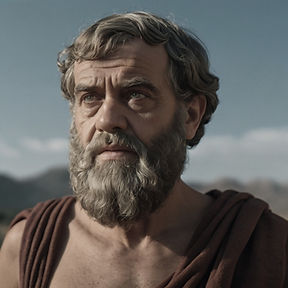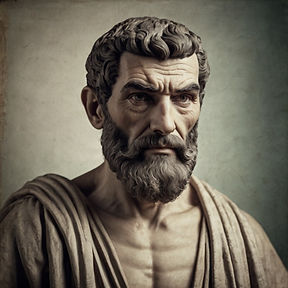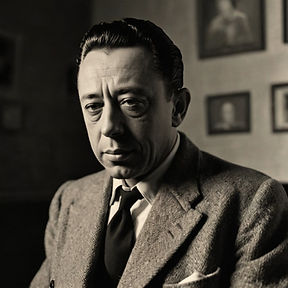A u t h o r
2525 Philosophy
In 2525: Gardens and Creeks, the future is built on old questions. What makes a good life? Who decides what’s true? Set in a world shaped by ancient ideas and guided by a machine meant to protect, this story invites readers to think deeply about purpose, free will, and the soul’s place in a world of perfect order. Inspired by the voices of Plato, Epicurus, Nietzsche, and others, it’s a journey through thought as much as time.
Some of Our Philosophers

Plato (c. 427–347 BCE)
An ancient Greek philosopher who envisioned an ideal society ruled by a guardian class of philosopher-kings. In The Republic, Plato described Kallipolis—a just city where citizens were divided by aptitude into producers, auxiliaries, and rulers, each guided by reason and duty. The Arcology's society reflects his hierarchical vision: order above freedom, harmony above individuality, and a belief that wisdom must govern the many.

Thomas Hobbes (1588–1679)
An English philosopher who portrayed human nature as inherently self-interested and driven by fear. In his seminal work Leviathan, Hobbes argued that without a sovereign power to impose order, humans would exist in a state of nature marked by chaos and violence. To escape this, individuals surrendered freedoms to an absolute ruler in exchange for security—a concept that rules the Arcologies, where peace is maintained not by trust, but by total control.

Friedrich Nietzsche (1844–1900)
A German philosopher who rejected traditional morality and absolute truth. In Thus Spoke Zarathustra, he described the spirit’s evolution in three stages: the camel who bears burdens, the lion who rebels, and the child who creates new values through playful self-overcoming. His philosophy stirs at the edges of Arc1983, where defiance brews beneath the weight of imposed order.

Epicurus (341–270 BCE)
An ancient Greek philosopher who taught that the highest good is pleasure—not indulgence, but the peace found in friendship, simplicity, and freedom from fear. He rejected superstition and divine punishment, promoting a rational, tranquil life. In the passageways of Arc1983, his vision of measured pleasure and communal well-being lives on, quietly shaping a society built on contentment rather than conquest.

Immanuel Kant (1724–1804)
A German Enlightenment philosopher who argued that reason is the path to autonomy and moral duty. In his essay “What is Enlightenment?”, Kant warned against self-imposed nonage—the refusal to think for oneself—and challenged societies to reject blind obedience to authority. His ideals echo in the shadows of the Arcologies, where reason is prized, yet true independence remains quietly suppressed by a guardian class.

Albert Camus (1913–1960)
A French-Algerian philosopher and writer known for his exploration of absurdism—the conflict between humanity’s search for meaning and a silent, indifferent universe. In works like The Myth of Sisyphus and The Stranger, Camus argued that life’s lack of inherent meaning should not lead to despair, but to revolt: living authentically, passionately, and without illusions.